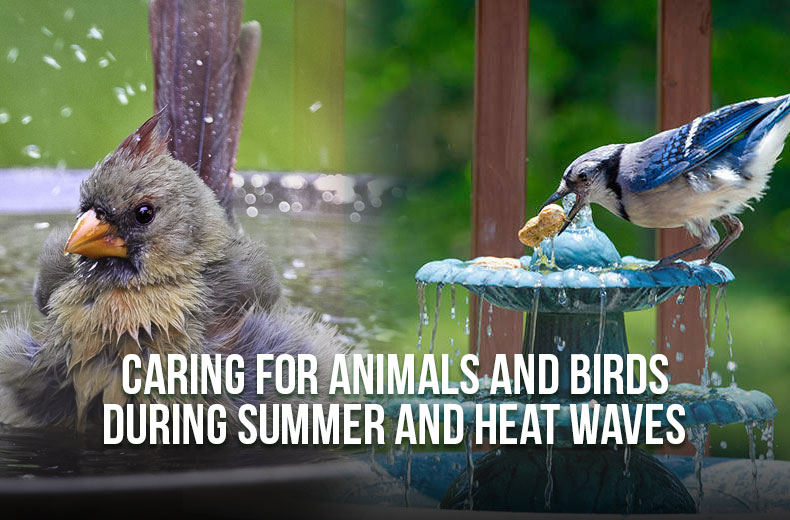As the summer season approaches and temperatures soar, it becomes crucial to ensure the well-being of animals and birds around us. Both domestic and wild animals are vulnerable to the harsh effects of extreme heat, and it’s our responsibility to help them stay cool and hydrated. Always ensure that your pets have access to fresh, clean water by placing multiple water bowls around the house and in the yard. For birds, place bird baths or shallow dishes of water in shaded areas of your garden, refilling and cleaning them regularly to prevent the growth of algae and bacteria.
Make sure your pets have access to shaded areas throughout the day, using fans or air conditioning indoors to keep the environment cool, and providing well-ventilated shelters for outdoor pets. For birds, create shaded spots by planting trees or using umbrellas and canopies, and avoid disturbing bird nests during extreme heat as it can stress the birds further. Adjust feeding routines for pets by feeding them during the cooler parts of the day, such as early morning or late evening, and avoid heavy meals during the hottest parts of the day as it can increase body heat. For birds, offer high-moisture fruits like watermelon and cucumber to help keep them hydrated and place feeders in shaded areas to prevent the food from spoiling quickly.
Limit outdoor activities for pets to early mornings or late evenings when it’s cooler, and be mindful of hot pavement which can burn your pet’s paws, opting for grassy areas instead. Reduce disturbances around bird habitats during peak heat hours to prevent unnecessary stress and energy expenditure. Regular grooming can help pets remove excess fur, aiding in better heat regulation, but never shave your pet completely as their fur also provides protection against sunburn. For birds, ensure birdhouses and nests are clean and well-ventilated, and check for any signs of heat stress like excessive panting or lethargy, consulting a vet if needed.
Young, elderly, and sick animals are more susceptible to heat stress, so monitor them closely and keep them in the coolest areas of your home. For wildlife, leave out water dishes in your garden or balcony to help stray animals and birds, avoiding the use of metal containers as they can get very hot under direct sunlight. In case of emergencies, recognize that heatstroke in pets can be a serious issue. Symptoms include excessive panting, drooling, and lethargy. If you suspect heatstroke, move the pet to a cool area, provide water, and seek veterinary help immediately. For birds showing signs of distress, gently move them to a shaded area and provide water, and contact a wildlife rehabilitator for further assistance.
Taking care of animals and birds during the summer season and heat waves requires some extra effort, but it’s well worth it to see them happy and healthy. Simple actions like providing water, creating shade, and adjusting routines can make a significant difference. By being mindful and compassionate, we can ensure that our furry and feathered friends stay safe and comfortable during the hottest months of the year.

